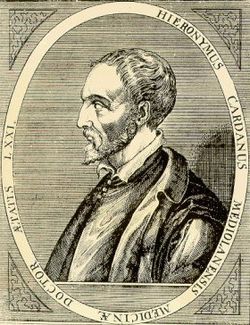Gerolamo Cardano (nonfiction)
Gerolamo (or Girolamo, or Geronimo) Cardano (Italian: [dʒeˈrɔlamo karˈdano]; French: Jérôme Cardan; Latin: Hieronymus Cardanus; 24 September 1501 – 21 September 1576) was an Italian polymath, whose interests and proficiencies ranged from being a mathematician, physician, biologist, physicist, chemist, astrologer, astronomer, philosopher, writer, and gambler.
He was one of the most influential mathematicians of the Renaissance, and was one of the key figures in the foundation of probability and the earliest introducer of the binomial coefficients and the binomial theorem in the western world. He wrote more than 200 works on science.
Cardano partially invented and described several mechanical devices including the combination lock, the gimbal consisting of three concentric rings allowing a supported compass or gyroscope to rotate freely, and the Cardan shaft with universal joints, which allows the transmission of rotary motion at various angles and is used in vehicles to this day. He made significant contributions to hypocycloids, published in De proportionibus, in 1570. The generating circles of these hypocycloids were later named Cardano circles or cardanic circles and were used for the construction of the first high-speed printing presses.
On October 6, 1570, Cardano was imprisoned for 87 days on charges of impiety (casting a horoscope of Christ). He spent the remaining five years of his life in Rome under the eye of a suspicious pope who nonetheless gave him a pension.
Today, he is well known for his achievements in algebra. He made the first systematic use of negative numbers, published with attribution the solutions of other mathematicians for the cubic and quartic equations, and acknowledged the existence of imaginary numbers.
In the News
Fiction cross-reference
Nonfiction cross-reference
- Blow book (nonfiction)
- Christopher Polhem (nonfiction) - later re-invented the Cardan joint
- Reginald Scot (nonfiction)
External links:
- Gerolamo Cardano @ Wikipedia
